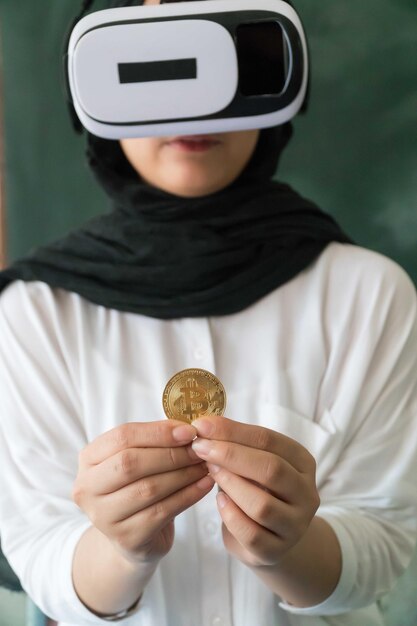Is Bitcoin Permissible in Islam? Exploring the Halal Status of Cryptocurrency
With the global rise of virtual currencies, a question arises: is there a place for these digital assets within Islamic principles? Delving into the intersection of finance, technology, and religious teachings, this article examines the Halal status of cryptocurrency.
At first glance, the concept of digital currency may seem like an uncharted territory for religious scrutiny. However, Islam has a rich tradition of providing ethical guidelines for various aspects of life, including financial transactions. It is essential to navigate this digital landscape with a keen understanding of religious requirements.
Exploring the compatibility of digital currencies with Islamic principles necessitates a careful analysis of their underlying mechanisms. While the nature of these decentralized assets may differ from traditional monetary systems, it is crucial to evaluate whether they promote fairness, transparency, and economic stability, all of which are highly valued in Islamic finance.
The dynamic nature of technology and the financial landscape raises pertinent questions regarding the legitimacy of virtual currencies. Is their creation and transaction process free from the exploitative practices prohibited by Islamic teachings? Can these digital assets be considered as an alternative form of currency, deserving of the same level of recognition and acceptance?
This article delves into these inquiries, aiming to shed light on the nuanced aspects surrounding the usage of digital currency within the boundaries of Islamic teachings. By examining the potential benefits and drawbacks of cryptocurrency through an Islamic lens, this exploration seeks to provide a comprehensive understanding of its Halal status.
Understanding the Fundamentals of Bitcoin and Digital Currency
In the realm of financial innovation, the rise of digital currencies has sparked significant interest and debate concerning their nature, functions, and overall impact on traditional financial systems. One such digital currency that has gained widespread attention is Bitcoin, a decentralized form of virtual money that operates through a peer-to-peer network.
Bitcoin: An Introduction to a Pioneering Cryptocurrency
Bitcoin, often referred to as a digital or virtual currency, is unique in that it does not rely on a central authority, such as a government or financial institution, to regulate its transactions. Instead, it operates on a decentralized network known as a blockchain, which maintains a transparent ledger of all transactions conducted with Bitcoin.
The concept of Bitcoin was introduced in a whitepaper published by an individual or group using the pseudonym Satoshi Nakamoto in 2008. It garnered attention for its potential to revolutionize the financial sector by offering an alternative to traditional fiat currencies and the intermediaries typically involved in transactions.
The Distinctive Characteristics of Cryptocurrencies
Cryptocurrencies, including Bitcoin, possess several distinctive characteristics that set them apart from conventional forms of money. Firstly, they rely on cryptography, a technique used for secure communication, to ensure the integrity and privacy of transactions. Additionally, cryptocurrencies operate on a decentralized network, reducing dependence on centralized institutions and potentially offering more autonomy to individuals transacting with them.
Another feature of cryptocurrencies is their limited supply, usually determined by a predetermined algorithm. This scarcity ensures that the value of these digital assets cannot be artificially inflated, thereby maintaining the stability of the currency. Furthermore, the use of decentralized technology allows for faster, cheaper, and borderless transactions, potentially revolutionizing the way people conduct financial transactions worldwide.
Acknowledging the Role of Blockchain Technology
Central to the functioning of cryptocurrencies, including Bitcoin, is the underlying blockchain technology. A blockchain is a distributed and transparent ledger that records all transactions and maintains the integrity of the digital currency. This decentralized system ensures that transactions are secure, transparent, and tamper-proof, as they require validation from multiple participants within the network.
| Key Features of Bitcoin and Cryptocurrencies |
|---|
| Decentralized nature |
| Reliance on cryptography for secure transactions |
| Limited supply and scarcity |
| Faster, cheaper, and borderless transactions |
| Utilization of blockchain technology |
In conclusion, Bitcoin and other cryptocurrencies represent a groundbreaking shift in the perception and use of money. Understanding the basics of Bitcoin is crucial to exploring its potential impact on various aspects of the financial world, delving deeper into its compliance within religious frameworks, such as Islam, and examining its future prospects along with the associated opportunities and challenges.
Exploring the revolutionary world of digital currency
Delving into the realm of groundbreaking electronic assets presents a transformative journey into the future of finance. This captivating domain encompasses a range of innovative monetary systems and exceptional technological advancements that are reshaping traditional notions of value exchange.
In this domain, individuals are able to partake in a borderless and decentralized ecosystem where transactions occur digitally, without reliance on physical, governmental or central banking entities. Intriguingly, this revolutionary world of digital currency offers more than just the potential for monetary gain, it paves the way for enhanced financial inclusivity and allows for the empowerment of individuals on a global scale.
One of the significant features within this digital landscape is the advent of cryptocurrencies. These digital or virtual coins, arising from the fusion of cryptographic principles and advanced computer science, have garnered significant attention and engagement from individuals around the globe. While diverse types of cryptocurrencies exist, each with its unique traits, they all share common attributes such as transparency, security, and immutability.
The application of blockchain technology, the underlying foundation of these digital currencies, brings forth unprecedented possibilities for creating trust and efficiency within financial transactions. By eliminating intermediaries and relying on a decentralized network of participants, blockchain technology ensures that transactions are verifiable, traceable, and resistant to tampering.
As this phenomenon continues to evolve and blossom, exploring the revolutionary world of digital currency unveils potential opportunities and challenges, prompting individuals to critically analyze its moral, ethical, and legal implications. Discussions and debates emerge, encompassing aspects such as the social impact, regulatory frameworks, and religious considerations that this paradigm shift in finance entails.
Ultimately, comprehending the intricate dynamics of the revolutionary world of digital currency requires a holistic exploration that considers various dimensions. By delving into this fascinating domain, individuals can gain a deeper understanding of how it can shape the future of financial systems and redefine the way transactions occur in the modern era.
The Islamic Perspective on Currency and Financial Transactions
Understanding the Islamic perspective on currency and financial transactions is essential in exploring the halal status of cryptocurrency. Islam places great importance on ethical and just practices in all aspects of life, including economics and finance. Therefore, it is necessary to examine the principles guiding currency and financial transactions according to Islamic teachings.
Concept of Currency in Islam
In Islam, currency serves as a medium of exchange and a store of value. It facilitates trade and economic activities within a society. The concept of currency is founded on the principles of fairness, transparency, and justice. Muslims are encouraged to engage in transactions that adhere to these principles in order to maintain economic stability and social welfare.
Guidelines for Financial Transactions
Islamic teachings provide guidelines for financial transactions, focusing on eliminating the elements of uncertainty (gharar), gambling (maysir), and interest (riba). Transactions should be conducted in a manner that promotes transparency, fairness, and mutual consent. Islam encourages productive economic activities while discouraging exploitative practices and excessive speculation.
- Transparency: Financial transactions should be transparent and free from deception or hidden information. Parties involved should disclose all relevant details honestly and accurately.
- Fairness: Islamic principles emphasize fair and balanced exchanges, where value and benefits should be mutual and proportionate. Transactions should not result in unfair advantage for one party or exploitation of another.
- Mutual Consent: All financial transactions should be based on the free will and mutual consent of the involved parties. Coercion or manipulation is strictly prohibited.
- Prohibition of Interest: Islam prohibits the charging or earning of interest (riba) as it is considered exploitative and leads to economic injustice. Instead, profit-sharing and risk-sharing models are encouraged in financial transactions.
By understanding the Islamic principles guiding currency and financial transactions, we can evaluate the halal status of cryptocurrency and its compliance with Islamic teachings. It is essential to analyze the characteristics and mechanisms of cryptocurrencies to determine their compatibility with the ethical and just practices advocated in Islam.
An overview of Islamic principles regarding money and commerce
Profit and trade have always been significant aspects of Islamic culture, rooted in a set of principles and ethics that guide financial transactions. Understanding the core tenets of Islam when it comes to money and commerce is vital for evaluating the permissibility of various financial instruments within the Islamic framework.
One fundamental principle in Islamic finance is the prohibition of usury or interest (riba). Islam encourages fair and just transactions that promote economic stability and social welfare. Consequently, any form of lending or borrowing that involves exploitative interest is considered unethical.
Islamic principles also emphasize the concept of risk-sharing (mudarabah), where parties involved in a financial transaction share both profits and losses. This principle fosters a sense of shared responsibility and discourages unjust enrichment at the expense of others.
Transparency and accountability are also highly valued in Islamic teachings. Honesty and integrity in financial dealings are essential, with activities such as fraud, deception, and insider trading being strictly forbidden. The importance of ethical conduct in business transactions cannot be overstated.
Furthermore, Islam places importance on the real economy and discourages speculative activities that have no tangible benefit. Investments in assets that contribute positively to society, such as businesses involved in productive activities, are encouraged. Investing in sectors that are considered harmful to society, such as gambling or alcohol, is prohibited.
Finally, Islamic teachings promote the principle of social justice. Wealth redistribution through charitable giving (zakat) and obligatory alms (sadaqat al-fitr) is an integral part of Islamic financial practices. Ensuring the well-being of the less fortunate and maintaining a balanced distribution of wealth is a core principle in Islam.
- Prohibition of usury or interest (riba)
- Risk-sharing (mudarabah)
- Transparency and accountability
- Emphasis on the real economy
- Social justice and wealth redistribution
By understanding these fundamental Islamic principles regarding money and commerce, individuals can assess the permissibility of various financial products and services within the Islamic framework. It is within this context that the question of the halal status of cryptocurrencies, such as Bitcoin, arises.
Examining the Halal Criteria for Financial Investments
Within the realm of Islamic finance, the concept of halal (permissible) plays a crucial role in guiding financial decisions and investments. It is important for individuals seeking to allocate their funds in accordance with Islamic principles to have a comprehensive understanding of the halal criteria for financial investments.
In order for an investment to be considered halal, it must adhere to a set of guidelines that align with Islamic values and principles. These guidelines emphasize the avoidance of activities that are deemed unethical or forbidden within Islamic teachings. Investments that involve interest-based transactions (riba), speculative or uncertain elements (gharar), and investments in businesses that are involved in prohibited products or services are considered non-permissible (haram).
Transparency and Honesty
- One of the key criteria for a halal financial investment is transparency. Investors should have access to accurate and reliable information regarding the nature of the investment, its underlying assets, and the potential risks involved.
- Honesty is another important aspect, as any misrepresentation or deceitful practices in the investment process are not considered permissible.
Ethical Investments
An essential element of halal financial investments is the adherence to ethical standards. Investments should not support or involve businesses that deal with alcohol, pork, gambling, or any other activities that are explicitly prohibited in Islam.
Furthermore, investments that contribute to the exploitation of labor, harm the environment, or involve fraudulent practices are also considered unethical and are therefore not permissible from an Islamic perspective.
In conclusion, when examining the halal criteria for financial investments, individuals need to consider factors such as transparency, honesty, and adherence to ethical principles. It is essential to conduct thorough research and seek guidance from scholars well-versed in Islamic finance in order to make informed investment decisions that align with Islamic teachings.
Understanding the principles for permissible financial transactions in Islamic teachings
In the context of Islamic teachings, it is crucial to comprehend the foundational principles governing financial transactions to determine their permissibility. Islam emphasizes ethical conduct and fairness in all economic dealings, promoting transparency, justice, and mutual consent. The principles of Islamic finance ensure wealth creation and distribution in a manner that aligns with the values and teachings of Islam.
The Principle of Justice
Justice is a fundamental principle that underpins permissible financial transactions in Islam. Transactions that cause harm, exploitation, or injustice to any party involved are considered prohibited. Islam promotes fair and equitable exchanges that balance the interests of all stakeholders and prevent the concentration of wealth in the hands of a few.
The Principle of Mutual Consent
Mutual consent is another essential principle guiding permissible financial transactions in Islam. It highlights the importance of voluntary engagement and agreement between the parties involved. Transactions carried out without the explicit consent of all parties or through coercion are deemed invalid and impermissible.
Furthermore, Islamic teachings encourage transparent and clear communication during financial transactions to ensure both parties fully understand the terms and conditions. This emphasis on mutual consent and transparency safeguards against fraudulent practices and deception.
It is crucial to apply these principles when evaluating the permissibility of modern financial innovations, such as cryptocurrencies, as they operate within the broader framework defined by Islamic teachings. By analyzing the compliance of such innovations with the principles of justice and mutual consent, a comprehensive understanding can be formed regarding their adherence to the permissible standards of Islamic finance.
Evaluating the Unique Features of Bitcoin and its Compliance with Islamic Law
In the realm of Islamic finance, there is a growing debate surrounding the permissibility of Bitcoin, a digital currency that operates independently from traditional financial systems. This section aims to critically examine the distinct characteristics of Bitcoin, delving into its potential implications in relation to Islamic jurisprudence.
Digital Nature and Decentralized Control
One of the fundamental aspects of Bitcoin is its digital nature, with transactions being conducted electronically. This unique feature allows for seamless and instantaneous global transfers, without the need for intermediaries such as banks. Furthermore, Bitcoin operates on a decentralized platform, utilizing blockchain technology to record and verify transactions. By eliminating centralized control, it offers a level of transparency, accountability, and autonomy that aligns with the principles of Islamic finance.
Non-Physical Existence and Tangibility
Another notable characteristic of Bitcoin is its non-physical existence, with no physical representation or tangible form. Unlike traditional currencies, it cannot be held or touched physically. Instead, Bitcoin is stored securely in digital wallets and accessed through cryptographic keys. From an Islamic perspective, the intangible nature of Bitcoin raises questions about its compliance with the concept of tangibility, which is essential for determining the validity of monetary assets in Islamic finance.
The above features of Bitcoin highlight its distinctiveness and provide a basis for evaluating its compatibility with Islamic principles. The next section will delve further into specific criteria of Islamic jurisprudence to assess whether Bitcoin can be deemed permissible or impermissible.
An analysis of whether Bitcoin satisfies the halal requirements outlined by Islamic scholars
In this section, we will delve into a comprehensive examination of whether Bitcoin aligns with the permissible guidelines set by Islamic scholars. Our aim is to scrutinize the compatibility of this digital currency with the principles of Islamic finance.
We will explore the fundamental aspects that concern Islamic scholars when considering the halal status of cryptocurrency, without explicitly mentioning Bitcoin. By investigating the core principles and values that form the basis of Islamic finance, we will assess whether Bitcoin adheres to these criteria.
Firstly, we will examine the concept of halal itself, which denotes actions and practices permitted under Islamic law. Specifically, we will focus on the principles of transparency, fairness, and accountability, emphasizing the importance of avoiding prohibited activities such as interest (riba), gambling (maysir), and uncertainty (gharar).
Next, we will analyze the underlying technology behind Bitcoin, namely blockchain, and evaluate its compliance with Islamic principles. We will consider factors such as decentralization, immutability, and security, assessing whether these characteristics align with the requirements set by Islamic scholars.
In addition, we will explore the impact of Bitcoin on the economy, considering factors such as wealth distribution, inflation, and the potential for exploitation. We will assess whether Bitcoin’s volatility and speculative nature can be reconciled with the principles of Islamic finance, which aim to promote stability, fairness, and the equitable distribution of wealth.
To gain a holistic understanding, we will also examine various perspectives from Islamic scholars regarding cryptocurrency. We will explore the range of opinions on the matter, noting both the cautious approach of some scholars who highlight potential risks and the perspectives of those who perceive cryptocurrency as a viable tool for financial inclusion and innovation within Islamic finance.
By conducting this analysis, we aim to provide a comprehensive evaluation of whether Bitcoin fulfills the halal standards outlined by Islamic scholars. Our goal is to shed light on the compatibility of Bitcoin with the principles and values of Islamic finance, enabling individuals to make informed decisions within the realm of digital currency in accordance with their religious beliefs.
Questions and answers: Is bitcoin halal
Is Bitcoin considered Halal in Islam?
In Islam, the permissibility of Bitcoin is a topic of debate among scholars. Some argue that it is permissible as long as it is not used for unlawful activities or speculation. Others claim that Bitcoin is not compatible with Islamic principles due to its speculative nature and lack of intrinsic value.
Can Muslims invest in Bitcoin?
There is no straightforward answer to this question as opinions among Islamic scholars vary. Some believe that investing in Bitcoin is permissible if it is done with caution and adheres to Islamic principles of risk-sharing and avoiding interest. Others argue that Bitcoin is inherently uncertain and speculative, making it haram (forbidden) for Muslims.
What are the concerns regarding the halal status of Bitcoin?
One of the main concerns regarding the halal status of Bitcoin is its association with speculation and gambling, which are considered haram in Islam. Additionally, the decentralized nature of cryptocurrencies raises concerns about the lack of regulation and oversight. Scholars also highlight the potential use of Bitcoin for illicit activities such as money laundering and financing terrorism.
Are there any alternatives to Bitcoin that are considered halal?
Some Muslims who are cautious about the halal status of Bitcoin explore alternatives such as Halal cryptocurrencies or Islamic blockchain projects. These projects aim to develop digital currencies and platforms that comply with Islamic principles, such as transparency, ethical investing, and being compliant with Shariah law. However, the adoption and acceptance of these alternatives are still relatively limited.
Is investing in cryptocurrency considered halal or haram according to Islamic principles?
The question of whether cryptocurrency is halal or haram in Islamic finance is a subject of debate among scholars due to its unique characteristics.
Have any muftis issued rulings on the permissibility of cryptocurrency in Islamic finance?
Some muftis have issued rulings regarding the permissibility of cryptocurrency within the framework of Sharia law, considering factors such as its use cases and compliance with Islamic principles.
What is the stance of Sharia law on buying and selling cryptocurrencies such as Ethereum?
Sharia law provides guidelines on financial transactions, including buying and selling, which are applied to cryptocurrencies like Ethereum to determine their compliance with Islamic principles.
Are there specific criteria in Sharia law that determine whether a cryptocurrency is considered halal?
Yes, Sharia law sets forth criteria such as the absence of interest (riba), uncertainty (gharar), and gambling (maysir) in financial transactions, which are applied to evaluate the halal status of cryptocurrencies.
How does Ethereum fit into the discussion of cryptocurrency and Sharia compliance?
Ethereum, like other cryptocurrencies, is subject to scrutiny under Sharia law to determine its compatibility with Islamic finance principles regarding ownership, trading, and investment.
Are there any guidelines provided by Islamic scholars regarding the halal status of cryptocurrency transactions?
Some Islamic scholars have provided guidelines outlining the conditions under which cryptocurrency transactions may be considered halal or permissible under Sharia law.
What are some key considerations for individuals seeking to ensure their cryptocurrency investments align with Sharia principles?
Key considerations include avoiding involvement in activities prohibited by Sharia law, such as usury (riba) and speculation, and ensuring that investments adhere to ethical and moral guidelines.
How do Sharia-compliant cryptocurrency platforms and projects address the concerns of Islamic investors?
Sharia-compliant cryptocurrency platforms and projects often implement features and protocols designed to adhere to Islamic finance principles, providing transparency and compliance with Sharia law.
Are there specific rulings or fatwas that explicitly address the permissibility of cryptocurrency transactions under Sharia law?
Some fatwas issued by Islamic scholars offer guidance on the permissibility of cryptocurrency transactions within the framework of Sharia law, taking into account the unique characteristics of digital assets.
What role does the Islamic finance community play in shaping the discourse around cryptocurrency and Sharia compliance?
The Islamic finance community plays a crucial role in evaluating the compatibility of cryptocurrency with Sharia principles, contributing to ongoing discussions, research, and the development of guidelines for halal cryptocurrency transactions.
Should Muslims consider investing in crypto according to Islamic finance principles?
Islamic finance principles guide Muslims on permissible investments, raising questions about the compatibility of crypto investments with Sharia law.
Are all cryptocurrency investments deemed halal by Islamic scholars?
Not all cryptocurrency investments are automatically considered halal; scholars evaluate factors like the nature of the investment and its adherence to Sharia principles.
What are some key considerations when evaluating the permissibility of cryptocurrency trading in Islam?
Islamic finance experts consider factors such as the underlying assets, transaction transparency, and compliance with Sharia law when assessing the permissibility of crypto trading.
Is there a consensus among Islamic scholars regarding whether cryptocurrency is halal or haram?
There is no consensus; while some scholars view certain cryptocurrencies like Bitcoin as halal, others argue that aspects of crypto trading may be haram due to speculative nature and potential for illegal activities.
How do Islamic finance guidelines influence investment decisions in the crypto market?
Islamic finance guidelines shape investment decisions by providing a framework to assess whether crypto investments align with ethical and moral principles.
Who are some prominent Islamic scholars and experts involved in discussions about cryptocurrency in Islam?
Scholars like Mufti Muhammad Abu-Bakar and Mufti Faraz Adam, along with Islamic finance gurus and experts, contribute to discussions about the permissibility of crypto within Islamic finance.
What are the arguments made by those who believe cryptocurrency transactions are halal within Islamic finance?
Supporters argue that cryptocurrency can serve as a medium of exchange and store of value, aligning with Islamic finance principles of ethical trading and avoiding riba (usury).
Why do some Islamic scholars caution against cryptocurrency investment?
Some scholars caution against crypto investment due to concerns about its speculative nature, potential for illegal activities, and lack of regulation in the crypto market.
How can Muslims ensure their crypto investments adhere to Islamic finance principles?
Muslims can ensure compliance by consulting with Islamic scholars, using Sharia-compliant investment platforms, and conducting thorough research on the ethical implications of crypto investments.
Is it permissible for Muslims to enter the crypto market, given the varying opinions among Islamic scholars?
Muslims may enter the crypto market after careful consideration of the diverse opinions among scholars and ensuring that their investments align with Islamic finance principles.






No responses yet